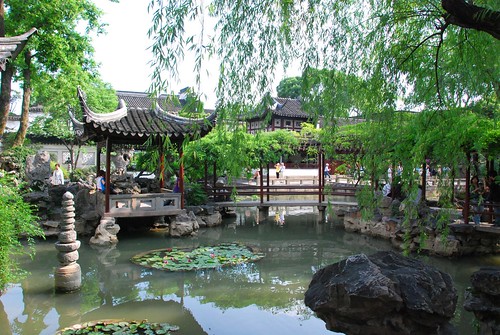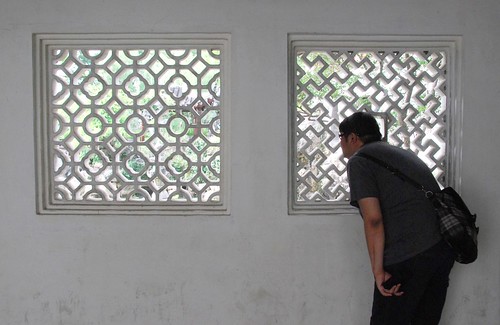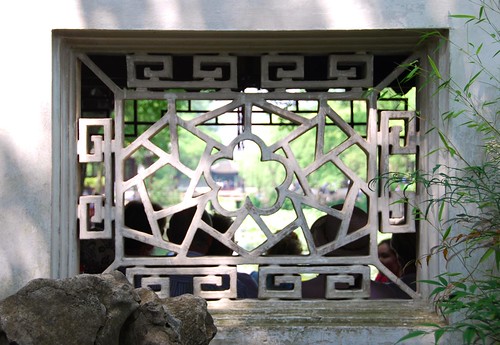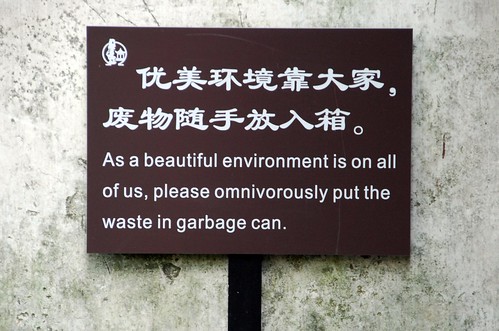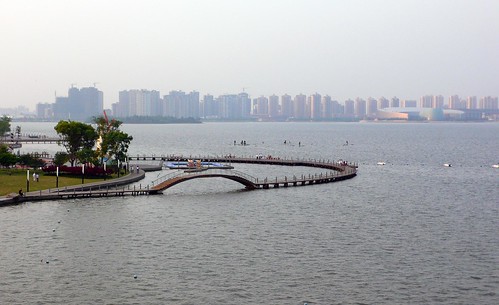Posts Tagged ‘Zhejiang’
Our looooong day in Hangzhou was followed by a much more leisurely morning exploring a floating village called Wu Zhen. The tour group arranged a boat trip through the village for us, which was quite picturesque and relaxing. As we floated down the canal, we saw many old homes that are still inhabited by families (as evidenced by their underwear and other laundry hanging out to dry—Chinese people are definitely not afraid of other people seeing their underthings).
As it turns out, this picturesque little village has a sad story. Wu Zhen was turned into a tourist attraction by the Chinese government, and even though visitors must pay an entrance fee, the residents do not receive any payment for the inconvenience of having hundreds of tourists filtering through their hometown on a daily basis. In fact, the people of Wu Zhen are not even allowed to vend until 4PM (when all the tour buses leave). I felt really bad for the village residents, because it was clear that their hometown had been turned into a zoo, and you could see in their faces that they were annoyed and frustrated by the constant stream of visitors coming to gawk at their “old” ways of living. As a result, I didn’t take too many photos here; I didn’t want to disturb these poor people anymore than we already were. Our tour guide explained that most of the young people had already moved out of the village; only the elderly (i.e., the people who could not afford to buy new homes) were still around. China’s incredible economic rise has brought a huge amount of prosperity to a huge amount of people, but the people of Wu Zhen have definitely been left out of that…unable to cash in on tourism even as their homes get turned into a modern-day Chinese Disneyland. China, as we are finding out, is many things, but it is almost never solely what you see on the surface.
We left for the town of Suzhou after our Wu Zhen tour, but before I get to that, I wanted to mention something else about our Hangzhou experience. This was Jeremy and I’s first time on a Chinese tour, and that in itself is an experience. Independent travel is not a big thing for Chinese—they prefer to travel in big groups, and they like the ease of a tour group; they don’t want to think about where to go next, or how to get there. You can see a Chinese tour group coming a mile away—they all (willingly) wear matching hats. Seriously, our tour guide told us that if he was taking a Chinese group around and they didn’t give them hats, everyone would change to a different tour service, saying “this crappy tour doesn’t even give you a free hat!”
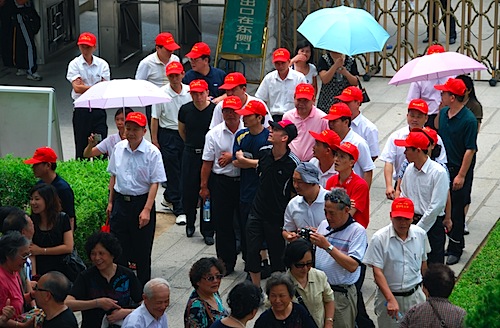
Not only can you SEE a tour group coming from a mile away, but you can HEAR them too. The matching hats are usually following a tour guide who carries a flag (usually yellow) and is screaming into a megaphone. You could be in the most serene, peaceful, natural setting, but the tour guide will be blabbering away on his/her megaphone. It’s almost like the Chinese feel they won’t get their money’s worth unless the tour guide is talking the entire time.
Our Chinese tour guides made some slight changes to accommodate our “American” group: we didn’t get hats, for example. But they still talk an awful lot (sometimes they even sing for you)—they even talk when we are sitting on the bus, in transit from sight to sight. Luckily, most of what our Hangzhou tour guide had to say was quite interesting…we found out, for example, that men in Hangzhou area of China do all the housework, in addition to earning all the household’s money. This is very unusual in China, as the country is an extremely patriarchal society. On top of that, in order to attract a bride, the man must own a home, which can cost at least 1 million RMB in Hangzhou (about US$150,000). This is not a small amount of money in China, and usually the parents help their sons buy their first house so that they have a chance attracting a desirable wife. As a result, Hangzhou is the one area in China where having a daughter is more desirable than having a son. I am not really sure what women in Hangzhou do, since they don’t work and their husbands do all the cooking, cleaning, grocery shopping, and laundry. I guess they just shop all day? As you might imagine, Hangzhou men are extremely desirable husbands in China. ![]()
OK, switching gears now to Suzhou, the garden city. Unlike the gardens in Beijing, which were built for emperors, Suzhou’s gardens were built for private citizens, so they are smaller and more intimate. We toured The Garden to Linger In the first day:
and a much larger garden (I can’t remember the name of it) the following day:

View of Leifeng Pagoda in the background. This is a feature of Suzhou gardens: incorporating background elements into the garden’s design.
My two favorite things about Suzhou’s gardens were (1) the amazing windows…each one has a different pattern, and there are hundreds of them!
And (2) Suzhou’s amazing Chinglish signs!
BTW, here’s a link to an amazing Chinglish brochure from our hotel…not to be missed!
That evening, we celebrated our final meal in China with Eddo, who was returning to Shanghai, while we went on to Wuyi Mountain. It was a lovely dinner, at a table that had to contain the world’s largest lazy susan:
The restaurant overlooked a large lake, and we got to see the huge amount of redevelopment that has gone on in Suzhou. Apparently Suzhou is following in Shanghai’s footsteps and building a large number of high rises as the Chinese economy booms.
Frank told us that he felt Suzhou has lost its charm…and it’s hard to disagree. I mean, the gardens are still there (many of them are UNESCO World Heritage sights, so they are protected), but it’s hard to imagine how that ancient way of life is going to coexist with a population that has an ever-growing appetite for the new and shiny. And if the old way of life does persist, will it just be an act? A show put on for tourists who want to come and visit “ancient” China?
Once again, if you just look a little bit deeper, you can see all the issues that China has to grapple with as they move full-steam towards modernity. China is a fascinating place at a fascinating time in its history, and it’s easy to see that the journey ahead for this huge country will involve some difficult choices…many of which are being put off for the short-term pleasure of economic prosperity.

